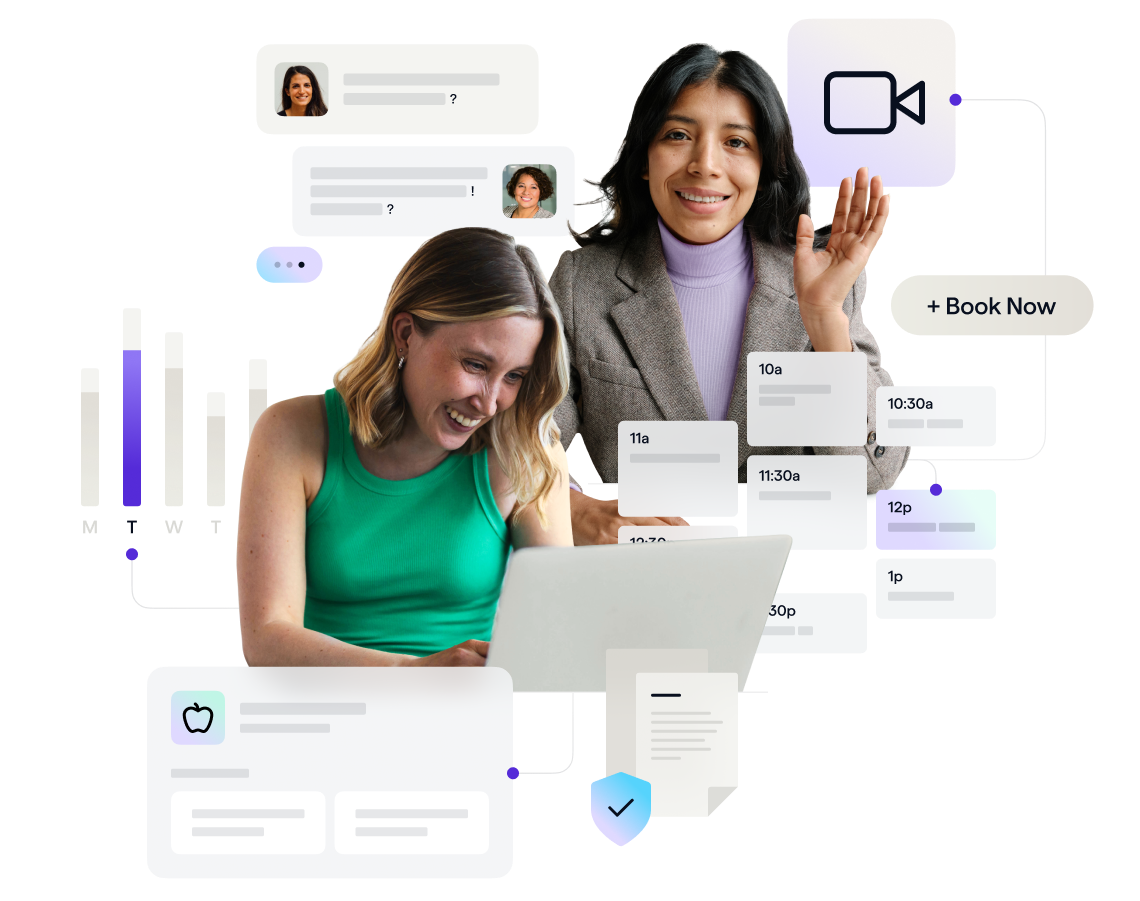

10 AI tools every private practice should know about in 2025
Discover 10 essential AI tools transforming private practices in 2025—from automated charting to personalized care plans and billing support. Learn how to streamline your workflow, boost client engagement, and scale with AI.
Once a futuristic idea, artificial intelligence is now a practical tool that’s helping private practice owners and clinicians streamline their work and enhance the care they deliver. By integrating AI in private practice, clinicians are able to operate more efficiently, reduce administrative burden, and spend more time with clients.
With new AI-powered solutions emerging every year—many of which are now available through platforms like Healthie Harbor—it's easier than ever to bring AI into your everyday workflow. Below, we explore 10 types of AI tools that are shaping how private practices operate in 2025.
10 tools to check out in 2025
Whether you're a solo provider or part of a growing team, the right AI tools can help you save time, improve accuracy, and deliver a more personalized experience for every client. Here are 10 types of AI solutions making a real impact across private practices in 2025.
1. AI-powered charting and documentation tools
Even with the advancements of using modern EHR and practice management solutions, there are still time-consuming tasks that clinicians hadn’t previously been able to automate. AI charting is having a big impact by auto-generating accurate SOAP notes, intake summaries, and treatment updates. These tools analyze your session transcripts or voice notes to produce clean, structured documentation—cutting hours off your administrative workload. While it's important to review AI-generated notes for accuracy, having notes automatically drafted can significantly speed up charting—allowing you to be present during sessions and reduce the time spent documenting afterward.
2. AI for personalized client or client plans
Whether you're creating a therapy treatment plan, a nutritional program, or a physical therapy regimen, AI can help you design personalized plans based on client data, preferences, and goals. Tools like these allow you to input health metrics, goals, and historical data to generate recommendations that adapt in real time. This makes it easier to offer a truly tailored approach—which can be a differentiating factor for your practice.
3: AI for administrative tasks
Not only can AI assist with clinical work, but it’s also great at tackling the behind-the-scenes tasks that can weigh down your day, such as automated scheduling, insurance verifications, task reminders, and follow-ups. By delegating to AI, you free up time for deeper client care and reduce the risk of errors. Many private practices are already using AI in therapy and other disciplines to simplify intake forms, streamline documentation requests, and improve internal communication.
4. AI for tracking client progress
Progress tracking tools powered by AI are helping clinicians gain insights into outcomes without manually sorting through data. These tools can analyze session trends, behavioral patterns, and health metrics to give you real-time snapshots of how your clients are doing. For example, AI in physical therapy can help identify which exercises are most effective for certain injuries, while therapy-focused platforms can suggest next steps based on mood tracking and engagement levels.
{{pp-newsletter-signup}}
5. AI-powered virtual assistants for practice management
Think of these tools as your digital front desk. AI-powered assistants can handle appointment reminders, FAQs, intake paperwork, and more—all while offering a conversational experience for clients. These tools reduce no-shows, improve accessibility, and ensure no message gets missed. They’re especially helpful for solo practitioners who wear multiple hats and don’t always have admin support.
6. AI for client management and engagement
Today’s clients expect a more dynamic experience, and AI can help you meet those expectations. With AI-driven client management systems, you can automatically send reminders, educational content, and check-ins between appointments. These tools also help you segment your client base, so you can better target support based on where someone is in their care journey. When done well, client engagement increases satisfaction, retention, and outcomes.
7. AI for practice marketing and client acquisition
Need help getting more eyes on your practice? AI in private practice marketing can optimize your online presence, create targeted campaigns, and analyze which messaging brings in new clients. AI marketing tools are especially effective for small practices with limited time or budget. From SEO improvements to email campaigns, these tools help you attract the right client demographics and grow strategically.
8. AI for enhancing session support and client interaction
Want help planning more impactful sessions? AI can assist with agenda building, resource recommendations, and session summaries. Some tools even provide prompts or coaching support based on how your client is responding. This is especially helpful in fields such as behavioral health, where ongoing conversations can benefit from subtle shifts in focus or tone. AI helps you show up more prepared and more present.
9. AI for billing, coding, and insurance management
No one loves insurance paperwork. That’s why AI-powered billing tools are a major win for private practices. These platforms help detect errors, match codes to services (including CPT codes), and even estimate reimbursements. Whether you're handling AI therapy notes or billing for a dietitian session, AI can simplify the coding and submission process—reducing claim denials and speeding up your revenue cycle.
10. AI for remote care enhancement
With telehealth in high demand, AI is stepping up to make virtual care smarter and more seamless. From real-time transcription to virtual visit summaries and follow-up recommendations, these tools make delivering care remotely just as effective as in person. Some AI platforms even help with remote monitoring, keeping clients engaged and informed between sessions. Whether you’re running a virtual-first clinic or offering a hybrid model, AI can strengthen your remote care experience.
Embracing AI in private practice
AI isn’t just for big hospitals or Silicon Valley startups—there are accessible tools available to improve business for solo practitioners and group private practices. Whether you're looking to reduce burnout, scale your services, or simply spend more time with clients, adopting artificial intelligence in private practice can make a meaningful difference.
At Healthie, we're committed to helping clinicians spend less time on administrative work and more time with their clients. As part of that mission, we’re excited to announce the release of AI Scribe by Healthie — our new AI-powered charting assistant designed specifically for private practices.
Scribe by Healthie automatically generates a draft chart note — using your selected Healthie Chart Note Template, tied to the corresponding Appointment Type — immediately following a telehealth session. No need to log into another platform, download transcripts, or re-upload notes. Everything happens seamlessly within the Healthie interface.
Providers can easily review, edit, and finalize chart notes before locking and signing them, ensuring clinical accuracy while saving valuable time.
We’ve already enrolled an initial group of customers in this new product, and we’re thrilled to be expanding access.
In addition to Scribe by Healthie, our platform integrates with a number of AI-powered Scribe solutions through Healthie’s Harbor Marketplace — giving practices the flexibility to choose the tools that best fit their workflow. [Explore our Scribe Partners here.]
We’re excited about the future of AI in healthcare, and the role it can play in extending the reach of clinicians and administrators alike. Expect to see even more AI-driven features and partnerships from Healthie as we continue to innovate.
👉 Want to be notified when Healthie AI Scribe is available for your plan? [Subscribe via our Portal Card here.]





